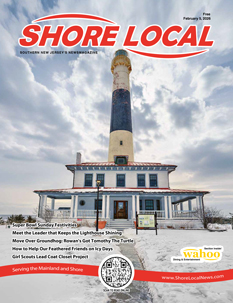By Meteorologist Joe Martucci
Summer. For the Jersey Shore, the start of summer might as well be New Years’ Day. After a fall of reflection, a winter of waiting and a spring of preparation, new life is breathed into our region as soon as the beaches and bays fill up. So with the shore as busy as ever and a breath of salty air pumping vigorously through our town’s lungs once more, let’s talk weather.
Hello Heat Wave
Our first heat wave of 2024 sizzled inland areas from June 18-23. There is no technical definition of a heat wave, but in the Northeast, it’s commonly known as three or more days with 90 degree or greater heat.
At Atlantic City International Airport in Egg Harbor Township, our primary inland reporting station in the area, the thermometer climbed into the 90s from June 20-23. The peak of the heat came on June 22 and June 23, both saw the thermometer sizzle with a high temperature of 98 degrees. We tied the record high temperature for June 23.
Heat waves in June are fairly common. Of the 184 heat waves to come to ACY Airport since records began in 1943, 39 of them were in June according to the National Oceanic and Atmospheric Administration (NOAA). That’s 21 percent. July has seen the most, with 84.
The shore did what the shore does best during the summer, keeping us cooler than those west beyond the bays.
Daily sea breeze development meant the Sen. Frank S. Farley State Marina in Atlantic City stayed in the 70s throughout this stretch, according to NOAA. Farther north, in Harvey Cedars on Long Beach Island, it was 74 degrees Sunday, according to the office of the New Jersey State Climatologist.
For the shore, the bigger story may have been how cold the ocean was. Atlantic City reported water temperatures in the 50s for much of this time, according to NOAA. Significant upwelling occurred thanks to the overarching southwest wind.
It’s not just the daytime warmth that’s hot, but the nights, too. If you have air conditioning, the balmy nights aren’t an issue. However, for those without air conditioning, warm nights leave us little ability for our bodies to cool off. That puts higher demand on our heart to pump more blood per minute. Respiratory distress is higher on these warm nights.
The airport broke daily warm minimum temperatures on June 22 (73 degrees) and June 23 (75 degrees). The marina avoided records but was at or above 70 degrees a number of nights.
More Heat Waves
Likely in July
It’s nearly guaranteed that July will wind up hotter than average, and it’s already our warmest month of the year.
The Climate Prediction Center, a branch of the National Weather Service based in Maryland, gives us just a 3% chance our area will be cooler than average in July. It’s 79 percent above average. That’s true from North Carolina to Vermont.
The reason is mainly due to a thicker-than-usual atmosphere expected over the eastern part of the country for at least the first half of the month. The thicker the atmosphere, the more heat it can hold.
Next week, Fourth of July week, should be an inland scorcher most days. This means more 90s for highs and 70s for lows. The shore will be at the whim of the localized wind direction. In general, you can expect more pleasant conditions here, which is why we love the shore in the first place. However, you can expect at least a few days in the 80s, with lows in the stuffy 70s, too.
Remember, too, the sun is very strong this time of year, just removed from the summer solstice on June 20. Sunscreen will be a must wherever you go.
Long range computer forecast models give me some confidence that the second half of the month will be closer to average. However, this is our climatological warmest time of the year. For the shore, that means pleasant. Atlantic City peaks around a comfortable 80 degrees, with lows in the low 70s. Go inland and you’re talking average highs in the upper 80s, with lows in the upper 60s.
We average 2.2 heat waves a year and have averaged just over three since 2000 because of our warming climate. So, there’s a good chance you’ll see more heat waves in the month to come.
Joe earned his Meteorology Degree from Rutgers University. He is approved by the American Meteorological Society as a Certified Broadcast Meteorologist and Certified Digital Meteorologist, the only one in the state with both. He’s won 10 New Jersey Press Association Awards. You can find him on social media @joemartwx












